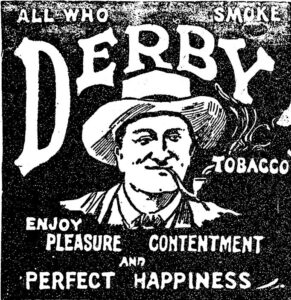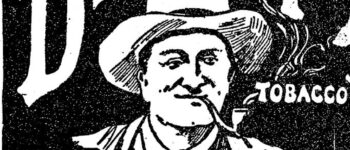2008: Prime Minister John Key
November 19, 2021
By AHNZ

It’s funny how this 1904 tobacco advertisement resembles the face of National 5.0 Prime Minister John Key. Key was sworn in to office on 19 November, 2008. He “served” 3 terms before retiring and handing over to Bill English who was, never the less, defeated at the 2017 election by Jacinda Ardern.
The marketing people for Derby had determined that this face would be associated by Kiwis with “pleasure, contentment, and perfect happiness.” The face has a smug and far-away gaze as if whatever this man is puffing can dissociate you from present concerns just like he is. Derby Man is certainly enjoying thinking about something but it’s in his future not the here and now.
“I hate having a mediocre, going-through-the-motions government. I am sick of Guy Smiley and his self-professed optimism. I heard him on radio saying I’m a glass-half-full kind of guy. Idiot. A glass half full is being filled. Our glass is half empty because it is being drained. NZ is not making progress economically and hasn’t for a long time. ” – Lindsay Mitchell (2009)
“The smug-ity is so palpable…” – Jo Woon, comment to AHNZ
“At some point these Guy Smiley types, with benevolence oozing from every pore, with their oily optimism and perky platitudes, stop being annoying and start being a hindrance.” – Lindsay Mitchell (2009)
 It’s the same face that National 5.0 (2008-2017) used on the front cover of its product. I think that Prime Minister, John Key, also had an inscrutable face. He wasn’t really there. He was Guy Smiley, Teflon. Key seemed to satisfy all the required signals and affectations, all the right masks and motions. Yet he didn’t seem to be empathetic with the people in the room, didn’t seem to be emotionally present. The PM’s happiness and perfect contentment, the public wished to believe, was related to current events but it was probably not. More likely, like the Derby Man, John Key’s ubiquitous bliss derived from covert thoughts about what he was going to be up to later when nobody was watching.
It’s the same face that National 5.0 (2008-2017) used on the front cover of its product. I think that Prime Minister, John Key, also had an inscrutable face. He wasn’t really there. He was Guy Smiley, Teflon. Key seemed to satisfy all the required signals and affectations, all the right masks and motions. Yet he didn’t seem to be empathetic with the people in the room, didn’t seem to be emotionally present. The PM’s happiness and perfect contentment, the public wished to believe, was related to current events but it was probably not. More likely, like the Derby Man, John Key’s ubiquitous bliss derived from covert thoughts about what he was going to be up to later when nobody was watching.
—
Image ref. Otago Witness (1904); Papers Past
Image ref. file photo, RNZ
 Like Comment Share
Like Comment Share





